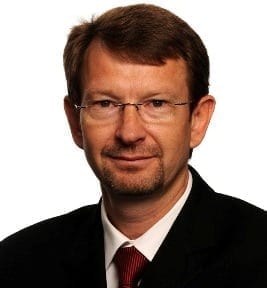The recently released World Economic Forum’s (WEF) Global Competitiveness Report has revealed that South Africa, while still enjoying a coveted second spot, has been overtaken by Mauritius as the most competitive country in Sub-Saharan Africa, and has slipped one ranking to 53rd in the 2013 / 2014 report. According to Hennie Heymans, Managing Director of DHL Express, infrastructure is a key indicator within the report, and South Africa’ needs to focus on infrastructure to improve the country’s competitive ranking.
Heymans says that efficient infrastructure is critical for ensuring the effective functioning of the economy, as it is an important factor in determining the location of economic activity and the kinds of activities, or sectors that can develop within a country. “South Africa is currently ranked 66th for infrastructure, in comparison to Mauritius at 50, which is well-developed by regional standards.” He points to the WEF’s 2012 Enabling Trade Index, which ranks South Africa as 63 in terms of enabling trade across borders, and reported that the simplification of import and export procedures appears to be overdue in the region and also contributes towards the country’s current trade bottleneck. “In comparison, Mauritius maintains the top position in Sub-Saharan Africa at 36th place in the index.” He explains that in order to make South Africa more competitive, infrastructure plays a key role in removing logistical barriers facing trade activity in the region. “Developing and improving efficient infrastructure structures will assist the South African economy compete with global trading partners and increase productivity in manufacturing and service delivery.“The current underdeveloped infrastructure in South Africa highlights the fact that untapped productive potential and resources are present in the region, all of which could be used towards making the country more competitive and attractive.
“South Africa is still the base for many companies wanting to do business in Africa but needs to recognize that this is under threat, and the competitors for this position – Nigeria, Kenya and Mauritius as examples – are close to home. We know that infrastructure development will be key to retaining this role but, similarly, a focus around creating a more favourable trade environment through reduced legislation will be crucial for success. Mauritius, which established a free trade zone a few years ago, is leading the way in this regard, and we could learn from their example.” Heymans says that the WEF Global Competitiveness Report has revealed that although Sub-Saharan Africa continues to record impressive growth rates, the continent as a whole trails the rest of the world in competitiveness, and requires efforts across many areas in order to catch up with developed continents. “We are however very positive about the continent going forward, and predict that as economic growth in Africa increases, the opportunities within the region will also increase, thus making the area more attractive,” concludes Hennie Heymans.






